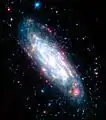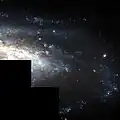| NGC 3198 | |
|---|---|
 NGC 3198 imaged by GALEX (ultraviolet) | |
| Observation data (J2000 epoch) | |
| Constellation | Ursa Major |
| Right ascension | 10h 19m 54.99s[1] |
| Declination | +45° 32′ 58.88″[1] |
| Redshift | 0.00227[1] |
| Distance | 47 Mly[2] |
| Apparent magnitude (V) | 10.3[3] |
| Characteristics | |
| Type | SB(rs)c[3] |
| Apparent size (V) | 8′.5 × 3′.3[3] |
| Other designations | |
| UGC 5572, MCG +08-19-020, PGC 30197[1] | |
NGC 3198, also known as Herschel 146[4] is a barred spiral galaxy in the constellation Ursa Major. It was discovered by William Parsons, 3rd Earl of Rosse (Lord Rosse), sometime before 1850.[2] NGC 3198 is located in the Leo Spur,[2] which is part of the Virgo Supercluster,[5] and is approximately 47 million light years away.[2]
NGC 3198 was one of 18 galaxies targeted by the Hubble Space Telescope (HST) Key Project on the Extragalactic Distance Scale, which aimed to calibrate various secondary distance indicators and determine the Hubble constant to an accuracy of 10%. The type and orientation of NGC 3198 made it suitable for these measurements.[6] The Wide Field and Planetary Camera 2 (WFPC2) of the HST was used to measure the magnitudes of 52 Cepheid variables, and the resulting distance modulus corresponded to a distance of 14.5 Mpc (47 million light years).[6]
Observations made with the Westerbork Synthesis Radio Telescope detected for the first time the presence of extraplanar gas.[7] The extraplanar gas makes up approximately 15% of the total atomic hydrogen (HI) mass of the galaxy.[7]
Two supernovae have been discovered in NGC 3198: SN 1966J, a Type Ib supernova,[2] and 1999bw, which was significantly fainter than expected when first discovered, and has been classified a Type IIn supernova.[8]
Gallery
.jpg.webp) NGC 3198 by the Sloan Digital Sky Survey
NGC 3198 by the Sloan Digital Sky Survey
 NGC 3198 by Hubble Space Telescope
NGC 3198 by Hubble Space Telescope
References
- 1 2 3 4 "NGC 3198". SIMBAD. Centre de données astronomiques de Strasbourg. Retrieved 5 July 2015.
- 1 2 3 4 5 O'Meara, Stephen James (2011). Deep-Sky Companions: The Secret Deep, Volume 4. Photographs by Mario Motta. Cambridge University Press. pp. 186–188. ISBN 978-1-139-50007-4.
- 1 2 3 Bratton, Mark (2011). The Complete Guide to the Herschel Objects. Cambridge University Press. p. 440. ISBN 978-0-521-76892-4.
- ↑ Clark, Maurice. "Herschel 146 / NGC 3198". Herschel 400 List Objects. Retrieved 2017-01-25.
- ↑ Monks, Neale (2010). Go-To Telescopes Under Suburban Skies. Springer. p. 53. ISBN 978-1-4419-6851-7.
- 1 2 Kelson, Daniel (1999). "The Hubble Space Telescope Key Project on the Extragalactic Distance Scale. XIX. The Discovery of Cepheids in and a New Distance to NGC 3198". The Astrophysical Journal. 514 (2): 614–636. Bibcode:1999ApJ...514..614K. doi:10.1086/306989.
- 1 2 Gentile, G. (2013). "HALOGAS: Extraplanar gas in NGC 3198". Astronomy & Astrophysics. 554: A125. arXiv:1304.4232. Bibcode:2013A&A...554A.125G. doi:10.1051/0004-6361/201321116. S2CID 56047203.
- ↑ Bishop, David. "Supernova 1999bw in NGC 3198". Astronomy Section Rochester Academy of Science. Retrieved 25 January 2017.
External links
 Media related to NGC 3198 at Wikimedia Commons
Media related to NGC 3198 at Wikimedia Commons